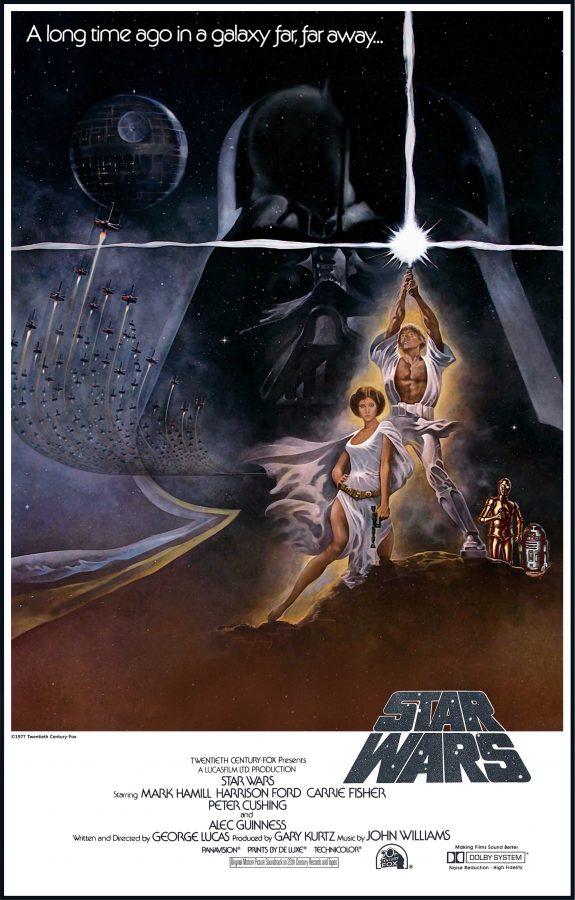Welcome to the “Star Wars” countdown and may the Force be with you. Each week leading up to the release of “Star Wars: The Force Awakens,” The Pitt News will retroactively review the “Star Wars” movies chronologically. The countdown continues this week with Episode IV: “A New Hope.”
In 1976, when upstart director George Lucas debuted a new pulpy science-fiction film, no one called it “A New Hope.” No one called it “Episode IV.” It was simply “Star Wars.”
This is what people should still refer to Lucas’ first entry in the indelible saga as. Even comparing the film to the breathtaking “The Empire Strikes Back” and the lively “Return of the Jedi” is, neither are as definitive or important as the primary passage of Luke Skywalker’s epic saga. “Star Wars” formed a gateway discovery and immersion into an unfamiliar world.
“Star Wars” is a cinematic masterpiece in an unconventional fashion — the film falls flat in many of the typical prerequisites for great storytelling.
Its overall premise isn’t exactly Hitchcockian, either. It’s the epic odyssey of Luke Skywalker (Mark Hamill) and his transition from farm boy to intergalactic rebel hero.
The acting performances are inconsistent, ranging from charismatically good — Harrison Ford and Alec Guinness as Han Solo and Obi-Wan Kenobi, respectively — to whiny and campy — Mark Hamill and Anthony Daniels, who voiced C-3PO. And although the script is practically “Citizen Kane” compared to the debacle that was “Attack of the Clones,” Lucas’ dialogue often seems stilted and unnatural.
But the film remains an overarching work and spawned an empire of film, television shows and merchandise because, from the second the Tantive IV hovers across the screen following the opening crawl, “Star Wars” transports viewers into a universe that already feels real, vibrant and populated.
Without overexplaining, the film instills familiarity in a world far, far away.
Lucas trusts moviegoers to buy into the premises of the film. The first characters on screen aren’t humans. Instead, an eccentric gold robot and a rotund blue and white trash can with legs are the first characters viewers see. It never feels off. It doesn’t feel weird. The film doesn’t explain who they are, what they are or where they are. It wants first-time viewers to experience the irreplicable sensation of discovery.
When the mysterious antagonist, Darth Vader, first appears, it is not certain if it is a man or a machine. Again, that doesn’t matter. The all black getup, the ominous breathing and the snarling expression on the mask explain that this figure is evil. That’s all that matters.
Like Vader, every main character comes from a different walk of life — there are no redundancies. Skywalker is the whiny but well-meaning youngster with a chip on his shoulder. Han Solo is the rough-around-the-edges tough guy. Obi-Wan Kenobi is the wise sage. The laser blaster-wielding Princess Leia Organa (Carrie Fisher) is one of the strongest female characters in popular film, at least in this installment. And Chewbacca (Peter Mayhew) is — well, he’s “Chewie.”
The scope of the film also furthers the expansiveness. Its high stakes — bolstered by a weapon that can blow up planets — are parlayed by the soaring, dramatic score by John Williams, whose fanfares from these films are among the most recognizable in modern music history. The whole galaxy is in peril, and Williams’ score makes sure you know that.
The expansiveness engulfed viewers in 1976. It engulfed me the first time my parents inserted the tape into the VHS player. And it has continued to amaze viewers, as excitement and passion for the franchise spawned from Lucas’ original film continues and grows. Just look at the upcoming film’s ticket sales.
People still care because of that first fascination. As “Star Wars” proceeded to “The Empire Strikes Back” and then “The Return of the Jedi,” the fascination morphed into adoration. They loved the places. They loved the characters. And whether “The Force Awakens” bombs or not, they’ll always still have “Star Wars.”


